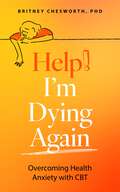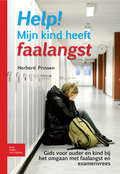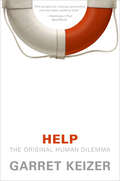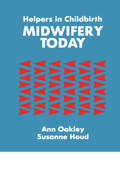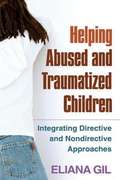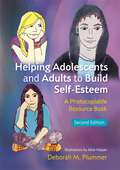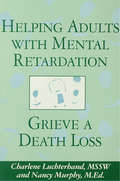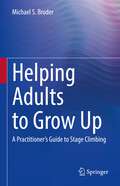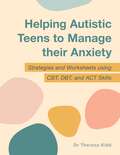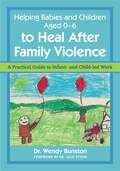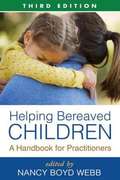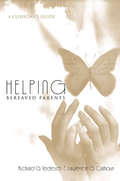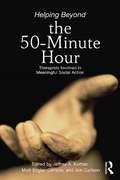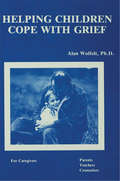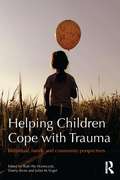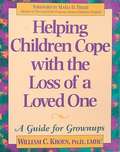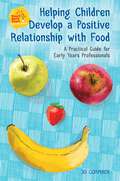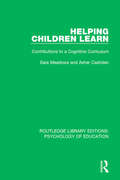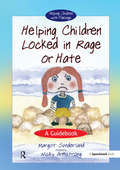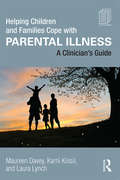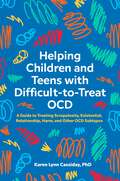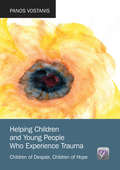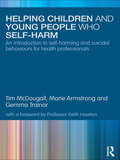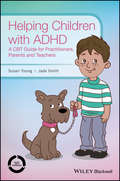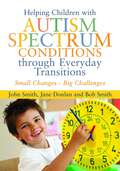- Table View
- List View
Help! I’m Dying Again: Overcoming Health Anxiety with Cognitive Behavioral Therapy (CBT)
by Britney ChesworthHas a new and unexplained lump, rash, or pain ever sent you into a tailspin? Have you spent hours online researching symptoms of serious illnesses or nagging your friends for confirmation that you weren't dying?Written by a therapist who has been there herself with her own health anxiety, Help! I'm Dying Again walks you through what health anxiety is, how it disrupts your life, and how to overcome it with cognitive behavioral therapy (CBT). Living in constant fear of your health is exhausting, but you can retrain your brain to not jump into overdrive at every new body sensation. You can live more comfortably without knowing all the answers, and, as scary as it seems right now, you can even be a little less afraid of death.Each chapter gives you CBT strategies for developing healthier thoughts, beliefs and behaviors to help you begin to see health and disease from a more grounded, less dire perspective. You aren't alone. It can get better, and it involves making small but intentional and consistent changes in your thoughts and behaviors each day.
Help! Mijn kind heeft faalangst
by Herberd PrinsenElk mens heeft faalangst. Ongeveer 12% van de jongeren tussen de 10 en 14 jaar heeft last van zijn faalangst. In dit praktisch boek krijgen ouders en kinderen handvatten om beter met faalangst te leren omgaan. De kern is; hoe herken je het bij je kind of bij jezelf? Hoe maak je het bespreekbaar? Wat kun je samen doen? Hoe kan ik meer ontspannen? Hoe kan ik er voor zorgen dat stress minder invloed op me heeft en hoe kan ik stress voorkomen? Dit boek geeft antwoorden op deze vragen. De oefeningen die in het boek worden beschreven zijn makkelijk uitvoerbaar en toepasbaar.
Help: The Original Human Dilemma
by Garret KeizerIn a book the San Francisco Chronicle called "unclassifiably wise" and a "masterpiece," noted Harper's essayist Garret Keizer explores the paradox that we are human only by helping others– and all too human when we try to help. It is the primal cry, the first word in a want ad, the last word on the tool bar of a computer screen. A song by the Beatles, a prayer to the gods, the reason Uncle Sam is pointing at you. What we get by with a little of, what we could use a bit more of, what we were only trying to do when we were so grievously misunderstood. What we'll be perfectly fine without, thank you very much. It makes us human. It can make us suffer. It can make us insufferable. It can make all the difference in the world. It can fall short. "Help is like the swinging door of human experience: 'I can help!' we exclaim and go toddling into the sunshine; 'I was no help at all,' we mutter and go shuffling to our graves. I'm betting that the story can be happier than that . . . but I have a clearer idea now than I once did of what I'm betting against." In his new book, Help, Garret Keizer raises the questions we ask everyday and in every relationship that matters to us. What does it mean to help? When does our help amount to hindrance? When are we getting less help–or more–than we actually want? When are we kidding ourselves in the name of helping (or of refusing to "enable") someone else? Drawing from history, literature, firsthand interviews, and personal anecdotes, Help invites us to ponder what is at stake whenever one human being tries to assist another. From the biblical Good Samaritan to present day humanitarians, from heroic sacrifices in times of political oppression to nagging dilemmas in times of ordinary stress, Garret Keizer takes us on a journey that is at once far–ranging and never far from where we live. He reminds us that in our perpetual need for help, and in our frequent perplexities over how and when to give it, we are not alone.
Helpers In Childbirth: Midwifery Today
by Ann Oakley Susanne HoudFirst Published in 1990. Routledge is an imprint of Taylor & Francis, an informa company.
Helping Abused and Traumatized Children
by Eliana GilPresenting an integrative model for treating traumatized children, this book combines play, art, and other expressive therapies with ideas and strategies drawn from cognitive-behavioral and family therapy. Eliana Gil demonstrates how to tailor treatment to the needs of each child by using both directive and nondirective approaches. Throughout, practical clinical examples illustrate ways to target trauma-related symptomatology while also helping children process painful feelings and memories that are difficult to verbalize. The book concludes with four in-depth cases that bring to life the unique situation of each child and family, the decision making process of the therapist, and the applications of developmentally informed, creative, and flexible interventions.
Helping Adolescents and Adults to Build Self-Esteem: A Photocopiable Resource Book
by Deborah PlummerPacked with activities and helpful advice, this resource is designed for professionals working to help adolescents and adults break the destructive cycle of low self-esteem. This fully updated new edition of Deborah M. Plummer's popular resource is filled with practical ideas for building healthy self-esteem. Easy-to-use photocopiable activity sheets encourage participants to use existing skills and develop new techniques to nurture confidence and feelings of self-worth. These are complemented by relaxation and breath control exercises, and expanded theoretical chapters that explains what healthy self-esteem is, why people may have low self-esteem and the consequences that can result from it. Suitable for work with individuals and groups in a wide range of educational and therapeutic settings, this resource will prove indispensable to teachers, speech and language therapists, professionals working in adult education centres, counsellors at schools and universities, social workers and other individuals working with young people.
Helping Adults With Mental Retardation Grieve A Death Loss
by Charlene Luchterhand Nancy E. MurphyFirst published in 1998. Routledge is an imprint of Taylor & Francis, an informa company.
Helping Adults to Grow Up: A Practitioner's Guide to Stage Climbing
by Michael S. BroderThis book presents Stage Climbing, an innovative seven stage developmental model as a new tool to help practitioners recognize cognitions, attitudes and behaviors-- typical of different life stages and thus levels of maturity-- in order to select the most effective treatment interventions with adult clients. It is the first book to integrate cognitive behavioral (CBT) concepts into the entire human development spectrum for any area of life that clients choose to work on. It demonstrates how resistance to change can reflect thinking and behavioral patterns that are characteristic of earlier developmental stages. It also presents a model of maturity along with treatment strategies and action steps to motivate change, as well as reactivate a client’s natural and organic maturation process. Practitioners at all levels from diverse disciplines and modalities will learn to assess how, why, and where clients are "stuck" developmentally. This volume offers practitioners, who treat individuals, couples and/or families a psychologically integrated road map that guides clients to take responsibility for living their best life, by removing self-created obstacles which prevent this from occurring naturally. The integration of the most robust aspects of psychodynamics, developmental psychology, and cognitive behavioral therapy will help the field continue to evolve, by providing state of the art interventions to help clients make mature and healthy changes in their lives. All mental health practitioners, regardless of their therapeutic orientations can use the strategies in this book to assess the underlying core belief patterns of clients at each life stage, and apply appropriate interventions to challenge self-defeating beliefs, and proactively work on agreed upon desired outcomes.
Helping Autistic Teens to Manage their Anxiety: Strategies and Worksheets using CBT, DBT, and ACT Skills
by Dr Theresa KiddDrawing on the author's extensive clinical and research experience, this book presents practical strategies purposefully developed for parents, therapists and teachers working with autistic adolescents experiencing anxiety. In addition, it features chapters dedicated to assisting parents in supporting their anxious child.The book outlines the co-occurence of anxiety and autism, highlights specific anxiety risks and triggers, and presents practical solutions for overcoming barriers to therapeutic engagement. A collection of CBT, ACT and DBT-informed practical worksheets are included, making this book ideal for use at home, at school or in OT, Psychology and Speech sessions.
Helping Babies and Children Aged 0-6 to Heal After Family Violence: A Practical Guide to Infant- and Child-Led Work
by Dr Julie Stone Dr Wendy BunstonAfter family violence, very young children and babies benefit from child-led therapy, but how do you achieve this? Dr. Wendy Bunston's guide is here to help you to meet the emotional needs of children who are experiencing trauma, and to enable them to form healthy attachments, both within their families and beyond. As well as clearly explaining the consequences of domestic violence on young developing brains, this book demystifies the practicalities of working effectively with children in their earliest years. Examining real-life cases, it notes the distress that arises when a child is separated from his or her family, advises on the importance and complexities of children's attachments, and shows how to support playfulness as an essential part of children's healthy personal development. Instruction is provided on how to include all family members in the healing process, including the perpetrators of family violence, in a positive way to improve children's chances of recovery. Dr. Wendy Bunston's unique approach to therapy and care, based on over 25 years' professional experience, promotes the viewing of cases from a 'child-led' perspective. Pragmatic, empathic and accessible, this book will be essential reading for anyone working with those affected by domestic violence.
Helping Bereaved Children, Third Edition
by Nancy WebbThis acclaimed work presents a range of counseling and therapy approaches for children who have experienced loss. Practitioners and students are given practical strategies for helping preschoolers through adolescents cope with different forms of bereavement, including death in the family, school, or community. Grounded in the latest research on child therapy, bereavement, trauma, and child development, the volume clearly explains the principles that guide interventions. Featuring a wealth of new content, the third edition retains the case-based format and rich descriptions of the helping process that have made the book so popular as a practitioner guide and text. New to This Edition Significantly revised and updated to reflect new information and approaches; 9 new topics covered. Covers additional types of loss war-related death in the family, deaths connected to natural disasters, and the loss of a pet. Additional therapy modalities cognitive-behavioral therapy and play therapy; conjoint caregiver child treatment; and bereavement groups and camps. Addresses how to help parents and teachers meet bereaved children's needs. Includes 11 reproducible assessment tools and handouts that can also be downloaded and printed from Guilford's website.
Helping Bereaved Parents: A Clinician's Guide (Series in Death, Dying, and Bereavement)
by Lawrence G. Calhoun Richard G. TedeschiThis book provides a concise, yet comprehensive guide to effective work with bereaved parents, combining a broad overview of current research, theory, and practice with the authors' own extensive clinical experience. Transcripts of individual, couple, and group meetings illustrate the delicate subtleties of this work, giving the reader helpful insights into more effective clinical practice. The authors emphasize the importance of approaching each parent as a unique person, while also considering the socio-cultural context of the bereaved. This book helps clinicians approach work with bereaved parents with a less scripted format, suggesting an alternative role as expert companion to the bereaved, allowing for a more uplifting experience for both parties.
Helping Beyond the 50-Minute Hour: Therapists Involved in Meaningful Social Action
by Jeffrey A. Kottler Jon Carlson Matt Englar-Carlson"Slacktivism" is a term that has been coined to cynically describe the token efforts that people devote to some cause, without long-term or meaningful impact. We wear colored wristbands, pins, or ribbons proclaiming support for a particular organization. We might post something on social network sites or send messages to friends about causes dear to our hearts. We might even volunteer our time to work on behalf of marginalized, oppressed, or neglected groups—or donate money to a charity. Yet the key feature of significant social action is follow through—continuing efforts over a period of time so as to build meaningful relationships, provide adequate support, and conduct evaluations to measure results and make needed adjustments that make programs even more responsive. This book is intended as an inspiration for practicing psychotherapists and counselors, as well as students, to become actively involved in a meaningful effort. The authors have searched far and wide to identify practitioners representing different disciplines, helping professions, geographic regions, and social action projects, all of whom have been involved in social justice efforts for some time, whether in their own communities or in far-flung regions of the world. Each of them has an amazing story to tell that reveals the challenges they’ve faced, the incredible satisfactions they’ve experienced, and what lessons they’ve learned along the way. Each story represents a gem of wisdom, revealing both questions of faith, as well as of sustained action. The authors have been encouraged to dig deeply in order to talk about the honest realities of their work. After reading their stories, you will be ready to pick a cause that speaks to you and begin your own work.
Helping Children Cope With Grief
by Alan WolfeltFirst published in 1984. Routledge is an imprint of Taylor & Francis, an informa company.
Helping Children Cope with Trauma: Individual, family and community perspectives
by Edited by Ruth Pat-Horenczyk Danny Brom Juliet M. VogelHelping Children Cope with Trauma bridges theory and practice in examining emerging approaches to enhancing resilience and treating traumatised children. Adopting a child-centred perspective, it highlights the importance of the synergy between individual, family, community and social interventions for recovery from post-traumatic stress. Consisting of chapters by an international range of contributors, the book is presented in three sections, reflecting the ecological circles of support that facilitate healthy development in the face of traumatic circumstances. Section 1, Individual, addresses the impact of exposure to trauma and loss on post-traumatic adaptation, focusing on biological aspects, attachment patterns, emotion regulation and aggressive behaviour in children. Section 2, Family, looks at the concept of family resilience, the impact of trauma on playfulness in toddlers and parents, innovative models for working with children traumatised by war, domestic violence and poverty and describes the challenges faced by refugee families in the light of intergenerational transmission of trauma. Section 3, Community, broadly explores the concept of community resilience and preparedness, the centrality of the school in the community during times of war and conflict, post-traumatic distress and resilience in diverse cultural contexts and the impact of trauma work on mental health professionals who live and work in shared traumatic realities. The book concludes with a theoretical discussion of the concept of Survival Mode as an organisng principle for understanding post-traumatic phenomena. Helping Children Cope with Trauma will provide mental health professionals, child welfare workers, educators, child development experts and researchers with a thorough understanding of the needs of children after trauma and how those needs may best be met.
Helping Children Cope with the Loss of a Loved One
by William C. Kroen Maria D. TrozziDr. William Kroen offers sound advice, comfort and compassion to any adult helping a child cope with death. Weaving in anecdotes about real children and their families, he explains how children from infancy through age 18 perceive and react to death and offers suggestions for how to respond to children at different ages and stages. Specific strategies are offered to guide and support them through the grieving process.
Helping Children Develop a Positive Relationship with Food: A Practical Guide for Early Years Professionals
by Jo CormackThis practical guide enables those working with young children to better understand, manage and support children's relationship with food. Revealing the different ways in which children can relate to food, it gives accessible guidance and advice about how to help children to develop psychologically healthy eating habits and behaviours, and how to tackle feeding issues such as picky eating, obesity and food anxiety. Included is an easy-to-use reference section for trouble-shooting, which contains advice on how special needs such as autism can affect children's feelings about food.
Helping Children Learn: Contributions to a Cognitive Curriculum (Routledge Library Editions: Psychology of Education)
by Sara Meadows Asher CashdanOriginally published in 1988, this volume presented a new understanding of how teachers in early childhood education helped children learn. It carefully and critically reviews different teaching approaches, and evaluates two innovatory teaching techniques which were at the focus of recent action research studies and which complemented the traditional early childhood curriculum at the time. The book is intended for all those concerned with early education, including students in initial training or those doing inservice courses for children between 3 and 7. Its contents will still be of relevance to people interested in playgroups and parent education.
Helping Children Locked in Rage or Hate: A Guidebook (Helping Children with Feelings)
by Margot Sunderland Nicky HancockThis is a guidebook to help children who: hurt, hit, bite, smash, kick, shout, scream or who are out of control, hyperaroused or hyperactive; can only discharge their angry feelings in verbal or physical attacks, rather than being able to think about and reflect on what they feel; are angry because it is easier than feeling hurt or sad; are locked in anger or rage because of sibling rivalry; are controlling and punitive; regularly defy authority or are diagnosed with a conduct disorder; commit cold acts of cruelty, hurt animals or do not cry any more; spoil, damage or destroy what others do or make; create fear in others because they have locked away their own fears; do not want to please people, cannot trust, have stopped looking for love or approval or truly believe they do not need anyone; do not really know how to 'like' someone; and, definitely do not know how to love someone or are affectionate only if they want something.
Helping Children and Families Cope with Parental Illness: A Clinician's Guide
by Karni Kissil Maureen Davey Laura LynchWhen a parent or parental figure is diagnosed with an illness, the family unit changes and clinical providers should consider using a family-centered approach to care, and not just focus on the patient coping with the illness. Helping Children and Families Cope with Parental Illness describes theoretical frameworks, common parental illnesses and their course, family assessment tools, and evidence-supported family intervention programs that have the potential to significantly reduce negative psychosocial outcomes for families and promote resilience. Most interventions described are culturally sensitive, for use with diverse populations in diverse practice settings, and were developed for two-parent, single-parent, and blended families.
Helping Children and Teens with Difficult-to-Treat OCD: A Guide to Treating Scrupulosity, Existential, Relationship, Harm, and Other OCD Subtypes
by Karen Lynn CassidayTreating subtypes of OCD, such as scrupulosity, harm, existential, and relationship OCD, in children and adolescents can often present a wealth of challenges. The nature of these lesser-known subtypes can make delivering common aspects of OCD treatment, including planning relevant exposures, and incorporating key adults in the child's treatment, difficult. Drawing from years of professional experience, Karen Lynn Cassiday provides comprehensive guidance using a wealth of case examples on how you can overcome these hurdles in the therapy room. Whether a newly qualified or experienced clinician, this book is essential for all practitioners wanting to tackle the clinical dilemmas generated when treating complex OCD in children, teens, and emerging adults.Bonus content! This book also gives access to a free video series containing demonstrations of exposure practice for each OCD subtype.
Helping Children and Young People Who Experience Trauma: Children of Despair, Children of Hope
by Panos VostanisThis groundbreaking new book brings together policy, evidence, practice, service development and children's narrative to provide a far-reaching overview of this vulnerable and traumatised group. It combines powerfully written, moving scenarios and draws on evidence-based research to fully illustrate concepts and present practical ideas for change t
Helping Children and Young People who Self-harm: An Introduction to Self-harming and Suicidal Behaviours for Health Professionals
by Tim McDougall Marie Armstrong Gemma TrainorEvery year thousands of children and young people attend emergency departments with problems resulting from self-harm. More still come to the attention of CAMHS teams, school nurses and other community-based services. Helping Children and Young People who Self-harm provides clear and practical guidance for health professionals and other members of the children’s workforce who are confronted by this complex and difficult area. Providing accessible evidence-based advice, this textbook looks at: what we mean by self-harm and its prevalence the legal background what works for young people who self-harm what children and young people think about self-harm assessment and interventions for self-harm prevention of self-harm service provision and care pathways. Essential for all those working with children and young people, this textbook contains a glossary of terms, practical strategies and case studies.
Helping Children with ADHD: A CBT Guide for Practitioners, Parents and Teachers
by Susan Young Jade SmithCombining the latest research evidence with the authors' practical expertise, Helping Children with ADHD offers a complete intervention programme for flexibly delivering behavioural and cognitive interventions to children aged 6-12 with ADHD and associated conditions. Redefines and develops best practice in the application of cognitive and behavioural techniques to help children aged 6-12 with ADHD and associated comorbid conditions, including learning difficulties Offers a range of engaging resources within a pragmatic and practically-focused approach; modular structure allows the interventions to be selected and tailored according to the particular age, ability and needs of the individual child An appendix of entertaining stories about Buzz, a boy with ADHD, provides structural narrative while also teaching core skills in areas such as keeping calm, planning, managing impulsivity and dealing with anxiety Straightforward, accessible language allows the techniques to be used by those without expert clinical training; dedicated sections provide advice for using the approach in school, home and group contexts A companion website provides downloadable materials including illustrated patient worksheets to accompany the narrative stories
Helping Children with Autism Spectrum Conditions through Everyday Transitions: Small Changes - Big Challenges
by John Smith Bob Smith Jane DonlanFacing any type of change can cause confusion and anxiety for individuals with autism spectrum conditions. This book looks at the small transitions in everyday life that can be a big deal for a child with autism and offers simple and effective strategies to make change less of a daily challenge. Explaining why seemingly minor changes to routine can be emotionally distressing for children with autism, this book teaches parents practical solutions for coping with common transitions including switching from a weekday to weekend schedule, the changing of the seasons, and sleeping in a different bed when on holiday. With insights from the authors' personal experiences and helpful scripts, signs and sketches to use along the way, this book shows that with planning and preparation parents can reduce the stress surrounding change for their child and the whole family. This book is the perfect tool to help children with autism deal with change in a calmer and more confident manner and will be essential reading for parents and any professionals working alongside them.
